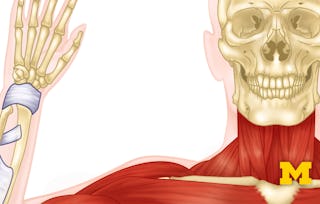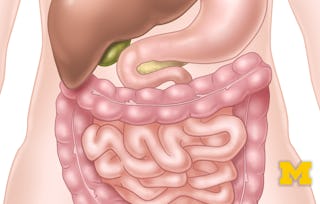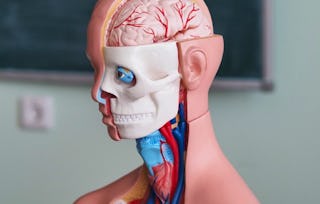This course aims to introduce the novice learner to the essential concepts of animal histology, focusing on the structure and function of tissues in the body. Histology plays a vital role in understanding how tissues support and maintain the organism’s functions, and this course highlights their importance in health and disease. The course will cover various types of animal tissues, each with its unique structure and role.

General Histology

Recommended experience
Skills you'll gain
Details to know

Add to your LinkedIn profile
9 assignments
See how employees at top companies are mastering in-demand skills

There are 8 modules in this course
In this module, students will explore the fascinating world of epithelial tissue, a vital component in maintaining the structure and functionality of various systems in veterinary anatomy. Through an in-depth examination of its histological characteristics, classifications, and specialized functions, learners will gain a comprehensive understanding of this essential tissue type and its role in health and disease.
What's included
6 videos1 assignment
This module delves into the intricate world of glandular tissue, highlighting its vital role in maintaining physiological balance and functionality in animals. Students will explore the structural and functional distinctions between endocrine and exocrine glands, learn about the diverse classifications of exocrine glands, and understand the mechanisms by which glands release their secretory products. Through focused lessons, this module equips learners with the foundational knowledge required to comprehend glandular anatomy and physiology in a veterinary context.
What's included
2 videos1 assignment
In this module, students will uncover the histological characteristics of connective tissues, explore the diverse cell types within connective tissue proper, and study the specialized structural organization of various connective tissue categories. Through a detailed examination of their distribution and functions, learners will gain insights into the critical roles these tissues play in maintaining the integrity and functionality of the animal body.
What's included
4 videos1 assignment
This module highlights cartilage tissue, a specialized connective tissue essential for structural support, flexibility, and joint functionality. Students will investigate the microscopic morphology, cellular and extracellular composition, and unique roles of the three types of cartilage: hyaline, elastic, and fibrocartilage.
What's included
5 videos1 assignment
In this module, students will explore the intricate architecture and vital functions of bone tissue, a cornerstone of the animal skeletal system. By examining the cellular composition, extracellular matrix, and specialized structures of bone, learners will gain a deep understanding of how bones provide support, facilitate movement, and protect vital organs. This module also compares the unique characteristics of compact and spongy bone, offering insights into their roles in animal anatomy and physiology.
What's included
4 videos1 assignment
This module provides an in-depth exploration of muscle tissue, a cornerstone of animal movement, stability, and physiological processes. Students will investigate the histological characteristics and unique properties of the three muscle tissue types—smooth, skeletal, and cardiac—while correlating their structures with specific functions and mechanisms of contraction. Additionally, this module examines the critical roles of connective and nervous tissue in muscle organization. It evaluates the impact of muscle disorders, such as atrophy and hypertrophy, on functionality and health.
What's included
5 videos1 assignment
This module delves into the complexities of nervous tissue, a key component in regulating and coordinating physiological processes in animals. Through a comprehensive exploration of neurons, glial cells, synapses, and the autonomic nervous system (ANS), students will gain an in-depth understanding of how nervous tissue facilitates communication within the body. The module also examines the structure and function of myelin, the contrast between myelinated and non-myelinated axons, and the histology of the spinal cord, providing a solid foundation for understanding nervous system functionality.
What's included
6 videos1 assignment
This module provides an in-depth examination of the cardiovascular system, focusing on its organization, histological features, and vital role in maintaining homeostasis. Students will explore the structural and functional characteristics of arteries, veins, capillaries, and lymphatic vessels, along with the unique histology of the heart. By understanding the microcirculatory bed and vascular endothelium, learners will uncover the mechanisms regulating blood flow and the consequences of structural changes, such as atherosclerosis, on vascular function.
What's included
5 videos2 assignments
Instructor

Explore more from Animal Health
 Status: Free Trial
Status: Free TrialRice University
 Status: Free Trial
Status: Free TrialUniversity of Michigan
 Status: Free Trial
Status: Free TrialUniversity of Michigan
 Status: Free Trial
Status: Free TrialRice University
Why people choose Coursera for their career

Felipe M.

Jennifer J.

Larry W.

Chaitanya A.

Open new doors with Coursera Plus
Unlimited access to 10,000+ world-class courses, hands-on projects, and job-ready certificate programs - all included in your subscription
Advance your career with an online degree
Earn a degree from world-class universities - 100% online
Join over 3,400 global companies that choose Coursera for Business
Upskill your employees to excel in the digital economy
Frequently asked questions
To access the course materials, assignments and to earn a Certificate, you will need to purchase the Certificate experience when you enroll in a course. You can try a Free Trial instead, or apply for Financial Aid. The course may offer 'Full Course, No Certificate' instead. This option lets you see all course materials, submit required assessments, and get a final grade. This also means that you will not be able to purchase a Certificate experience.
When you purchase a Certificate you get access to all course materials, including graded assignments. Upon completing the course, your electronic Certificate will be added to your Accomplishments page - from there, you can print your Certificate or add it to your LinkedIn profile.
Yes. In select learning programs, you can apply for financial aid or a scholarship if you can’t afford the enrollment fee. If fin aid or scholarship is available for your learning program selection, you’ll find a link to apply on the description page.
More questions
Financial aid available,

